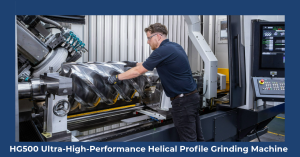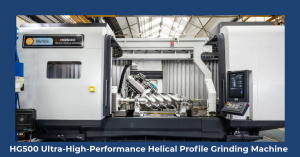Modernising machinery production capabilities through people-centric innovation and advanced technologies
“There are also a further two opportunities with existing customers seeking funding approval for placing orders in 2025. This would generate a further £7M in orders for this new machine.”
Philip Hart, CTO, PTG Holroyd
Established in 1860, PTG Holroyd is one of the oldest machine tool manufacturers in the world. The company, based in Rochdale, is renowned for their precision engineering, leading the industry in helical profile milling, helical rotor grinding, and friction stir welding. This allows them to serve a diverse range of industries, from aerospace and automotive manufacturing to the medical sector.
However, when the company turned their sights to developing a new helical profile grinding machine, a number of issues became apparent. In particular, the company found there was a lack of support available for developing and optimising machinery, as well as a lack of skilled workers trained in high-end machine tool manufacturing. Due to the need for large, high-accuracy components, expertise around grinding and milling was required but was difficult to find using the usual subcontract supply chain.
Working with the Advanced Machinery and Productivity Institute (AMPI) has allowed PTG Holroyd to connect with partners in the region and access the expertise required to address their machinery development needs.
In particular, PTG Holroyd has worked closely with AMPI partners and precision grinding experts Fives Landis and the University of Huddersfield. Fives Landis has provided high-precision milling and grinding to manufacture critical machine parts needed for the new helical profile grinding machine. Meanwhile, the University of Huddersfield’s experience and expertise with cutting-edge metrology has been of particular benefit, offering support not necessarily available from manufacturers.
Funding secured through AMPI has not only facilitated this collaboration, but also helped PTG Holroyd develop a digital twin (or virtual model) of their machine which assists in understanding their manufacturing processes and the manufacturing processes of their customers.
Through AMPI, PTG Holroyd now has the means to collaborate with other SMEs in the region, sharing information and cooperating to solve problems. These collaborations have allowed them to make use of specialised facilities and equipment that would otherwise be prohibitively expensive, impractical or impossible to access independently.
Working with Fives Landis and the University of Huddersfield has delivered the greatest possible precision in the design and manufacturing of their new grinding machine and has filled knowledge gaps needed to integrate it into their processes. Because these connections are so direct, collaboration through the network is agile, mutually beneficial and more open than would otherwise be possible.

The development of the new digital twin has additionally enabled the company to better estimate cycle times and improve their production planning, reducing downtime and improving efficiency. The digital twin enabled PTG Holroyd to highlight a problem with the machine design before machine assembly was completed.
This saved time and money by implementing a solution on the machine without impacting the project delivery. The digital twin also enabled remote software development to be caried out by the PTG GmbH office in Germany. This would not have been possible without the digital twin, again saving time and money on travel expenses.
Customers showed interest in the project at an early stage of the design process. This enabled PTG Holroyd to secure an order for the prototype machine into an academic institution. The machine will be used in the future development of large compressor rotors to a much higher accuracy and efficiency than has been previously possible through traditional machining methods.
Within four months of receiving the first order, a second order was received from an existing customer who had already purchased a machine of a different design. However, on seeing the development work being done on the HG500 large helical grinding machine they were keen to capitalise on the benefits that this machine could offer them. Consequently, they requested that their order was switched to a HG500 machine.
During the commissioning of the first prototype machine, a longstanding existing UK customer wanted PTG Holroyd to demonstrate the grinding of their largest rotor. Encouraged by the further interest in the machine at such an early stage, PTG Holroyd was happy to accommodate a demonstration. The demonstration was a success, and the customer could again see the benefits the HG500 machine could offer their capabilities. This customer is now at a very advanced stage on their capex approval for an order to be placed in the next few months. Once this order is confirmed PTG Holroyd will have received orders to the value of £5.25M.

Enquiry levels are strong for this machine. The customer of the first prototype machine is very pleased with the machine performance and is now seeking budget approval for a second machine. There are also a further two opportunities with existing customers seeking funding approval for placing orders in 2025. This would generate a further £7M in orders for this new machine.
Due to market volatility the traditional machine market has declined but due to the development of the HG500 it has enabled PTG Holroyd to retrain key design personnel. If the current levels of enquires continue to be converted to orders, then growth of the design and production departments will be required to satisfy the demand.
Through AMPI, PTG Holroyd has found the support they needed to develop their new grinding machine, building on their century-and-a-half of history and keeping themselves at the leading edge of precision engineering. The development of the HG500 has allowed PTG Holroyd to optimise their production techniques to make it more efficient to build and consequently give a better return on gross margin. The growth of this machine has allowed local supply chain vendors to capitalise on their success.
Innovation for Machinery (I4M) is a funding scheme that provides SME businesses in Greater Manchester and West Yorkshire with access to advanced machinery expertise to accelerate the development of the next generation of machinery and create new jobs and growth in this sector.
Find out if you are elidgble for funding